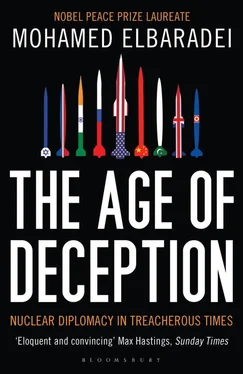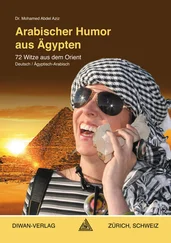It was an intensely personal few days. My family was with me—my wife, my mother, my son and daughter, my brothers and sisters—as well as friends and colleagues from the Agency and other close friends. My mother, as always, made me smile. In Cairo, when the announcement had been made in October, an avalanche of Egyptian and international media had poured into her home, where my family had gotten together. She had become an instant celebrity, talking about my childhood with tears in her eyes. In Oslo, despite her eighty years, she was floating happily from event to event. Driving from the ceremony to the hotel, the limousine flanked by a police escort, she announced, “This is like a dream. I feel like a queen.”
The Nobel award was a defining moment—not only for me personally but in the broader sense of public recognition for the work of the Agency and, as a corollary, the sense of unity and pride it brought to the IAEA Secretariat. The media had routinely spotlighted only a small fraction of our work—the role of weapons inspectors in a few critical places—when in fact we were verifying, year after year, more than nine hundred facilities in seventy countries. The wording of the Nobel citation made clear that the IAEA’s value rested not only in these safeguards verification activities—the work of one IAEA department—but also in our efforts to promote the safe and secure use of nuclear energy in peaceful applications: nuclear medicine to combat heart disease, isotope hydrology to trace and manage underground water aquifers, or plant breeding to grow barley plants that thrive in the altitudes of the high Andes. For such a diverse workforce, coming from a complex spectrum of cultural, educational, and occupational backgrounds, the abrupt elevation in public awareness of our work solidified the internal organizational conviction that all parts of the Agency were working toward a common purpose.
A second benefit was the access that came with visibility and an elevated platform. The IAEA’s work in Iraq before the March 2003 invasion had pushed the Agency into the international spotlight, turning it into one of the better-known global institutions. But with the Nobel award came an exponential expansion not only in media attention—an enviable roster of standing invitations from press channels worldwide—but also in our capacity to shape our message and deliver it to target audiences. We gained unprecedented access to political and other leaders on every continent; interactions that customarily had taken place at the ministerial level were now with heads of state. For the Agency, the norm had been redefined.
The Nobel recognition also made clear the importance of the IAEA’s independence and in some ways reinforced it. As Director General, I felt far more immune against accusations of being biased or soft and against those who would question my integrity. I also used the spotlight to draw attention to the Agency’s limited financial resources, which restricted our technological capability and, in turn, threatened our independence. For example, our reliance on satellite imagery to search for undeclared nuclear facilities could not be based solely on images passed to us selectively by two or three Member States; we needed the financial capacity to select and purchase our own images. Similarly, we needed to beef up the nuclear forensics capability of our own laboratories, rather than being dependent—as we were for the most sensitive types of fission track particle analysis—on a single laboratory operated by the U.S. Air Force. I began speaking out more publicly and with greater vigor about the need to bolster the IAEA’s independence with enhanced legal authority, technological capabilities, and financial support.
Of course, the Nobel Peace Prize did not diminish in any sense the formidable challenges we faced. But it certainly strengthened our hand, renewing our resolve for the tasks that lay ahead.
9
IRAN, 2006
“Not One Centrifuge”
By January 2006, the convoluted, stumbling negotiations between the international community and Iran over its nuclear program were at an impasse. The European offer of aid and technological assistance in exchange for Iran ceasing its nuclear development had been deemed insulting in its language and paltry in its benefits and had failed to recognize Iran’s security and political needs. When talks over that offer broke down, Iran resumed its conversion of uranium, ending the country’s voluntary suspension of nuclear activities. This led the IAEA Board to condemn Iran’s “noncompliance” with its obligations under the NPT.
No tangible progress was in sight. Iran was feeling bold: oil prices were high; China was dependent on Iranian oil and gas; and Russia, still constructing the reactor at Bushehr, was concerned with maintaining its good relationship with neighboring Iran.
So Iran took a calculated risk, informing the IAEA on January 3 that it intended to go one step further, by resuming uranium enrichment R&D. A letter followed asking the Agency to remove the seals on Iran’s enrichment facility at Natanz.
The size and scope of this calculated risk was to begin operating a small R&D enrichment cascade at the pilot plant. The Iranians did not imagine that the Security Council would impose further sanctions for this small pilot operation. Enrichment for peaceful purposes was, in any case, their right under the NPT; the suspension had always been specified as a voluntary goodwill measure to facilitate negotiations. It hardly seemed likely that the Security Council would take action against Iran given that most of Tehran’s “noncompliance” had been corrected over the previous two years, and its small enrichment operation was after all legal. As nearly as I could discern, the Iranians felt confident that there would be no negative repercussions, that negotiations with the Europeans would resume, and they would agree to a moratorium on industrial-scale enrichment.
The Russians, to their credit, tried to work out a compromise, proposing that Iran be allowed to run a small R&D program of thirty to forty centrifuges, the specifics of which would be determined in consultation with the IAEA. The Americans, however, were adamantly against any such compromise and Iran did not openly endorse it, so the Russians withdrew their suggestion.
I thought the Russian proposal made sense and could open up a way out of our stalemate. When Bolton’s replacement, Bob Joseph, visited me in Vienna, I told him so. Condoleezza Rice called me shortly thereafter, in my hotel room in Davos. “Our path seems to have diverted since we last met,” she said, her tone rather unfriendly. She implied that I supported an Iranian R&D program, thus legitimizing Iranian enrichment. As I told her, I had taken no public position on the issue but believed the benefit of the Russian proposal far outweighed its cost for two reasons. First, the IAEA needed to be able to inspect possible undeclared activities in Iran, thus it was essential that Iran continue to implement its Additional Protocol. Also, we needed to begin negotiations if we hoped to halt Iran’s progress toward industrial-scale enrichment. At the end of a tense conversation, I emphasized that IAEA Member States would decide how to proceed, but that I owed them at least my view of things. [1] After a meeting with Rice, the Russian foreign minister, Sergey Lavrov, publicly denied that there had ever been a Russian proposal. He obviously wanted to maintain the unity of the negotiating parties and did not want to disagree with the United States in public.
In February, the IAEA Board opened a new phase in the Iran saga—by referring the Iran file to the Security Council. The verdict came after more than two years of failed efforts by the EU-3 and Iran to reach an agreement on Tehran’s nuclear program through diplomacy. The Board vote was split: among its thirty-five members, five developing nations abstained, and three voted against the resolution, on the grounds that Iran’s suspension of enrichment activities had been voluntary and not legally binding. This split was a rare event; the Board traditionally has made a point of reaching its decisions by consensus, a practice often referred to as “the Spirit of Vienna.” The nonconsensus decision was not a good sign.
Читать дальше












